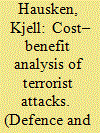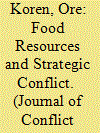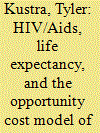|
|
|
Sort Order |
|
|
|
Items / Page
|
|
|
|
|
|
|
| Srl | Item |
| 1 |
ID:
157829


|
|
|
|
|
| Summary/Abstract |
A cost–benefit analysis of terrorist attacks is developed and placed within a systematic theoretical structure. For the target or object of the attack, we consider the lost value of human lives, lost economic value, and lost influence value, counted as benefits for the terrorist. The corresponding losses for the terrorist are counted as costs. The terrorist attacks if benefits outweigh costs. Bounded rationality is enabled where the three kinds of benefits and costs can be weighted differently. We account for two ex ante probabilities of successful planning and attack, and enable the terrorist to assign different weights to its multiple stakeholders. We introduce multiple time periods, time discounting, attitudes towards risk, and subcategories for the benefits and costs. The cost–benefit analysis is illustrated with the 11 September 2001 attack, and 53 incidents in the Global Terrorism Database yielding both positive and negative expected utilities. The paper is intended as a tool for scientists and policy-makers, as a way of thinking about costs and benefits of terrorist attacks.
|
|
|
|
|
|
|
|
|
|
|
|
|
|
|
|
| 2 |
ID:
170193


|
|
|
|
|
| Summary/Abstract |
A growing number of studies draw linkages between violent conflict and food scarcities. Yet, evidence suggests that within states, conflict revolves around food resources abundance. I develop an explanation for how the competition over food resources conditions the strategic behaviors of three actors: rebels, civilian producers who grow crops, and state forces. Using a statistical-strategic model, I validate my theory at the subnational level on new high specificity spatial data on staple crop access and productivity in Africa for the years 1998 to 2008 (and use the estimates to forecast conflict on out-of-sample data for 2009 to 2010). In line with theoretical expectations, local variations in food productivity have a positive, statistically significant, and substantive effect on the strategic behaviors of different actors. These findings suggest that the imperative for food denial as a microlevel tactic in civil war should be more seriously incorporated into the work of scholars and policy makers.
|
|
|
|
|
|
|
|
|
|
|
|
|
|
|
|
| 3 |
ID:
156537


|
|
|
|
|
| Summary/Abstract |
This article views death in battle as an opportunity cost whose size is determined by the number of years a rebel would have lived as a civilian. As civilian life expectancy declines, this opportunity cost does too, increasing the probability of rebellion. This theory is tested with a tragic natural experiment: the HIV/AIDS epidemic in sub-Saharan Africa. Using male circumcision rates as an instrument for life expectancy, the analysis shows that a one-year increase in life expectancy decreases the probability of civil war by 2.6 percentage points. This supports the theory that opportunity costs are important determinants of conflict onset and that nonpecuniary opportunity costs should be taken into account. This article concludes by noting that cost–benefit analyses of public health interventions should include decreases in the probability of civil war, and the attendant benefits in terms of lives saved and material damage prevented, in their calculations.
|
|
|
|
|
|
|
|
|
|
|
|
|
|
|
|
| 4 |
ID:
076113


|
|
|
| 5 |
ID:
164172


|
|
|
|
|
| Summary/Abstract |
Some terrorist organizations provoke their targets into deploying massive countermeasures, allowing terrorists to mobilize a greater share of their audience. Why would a government pursue such a costly strategy if it only strengthens the opponent? I develop a signaling model of terrorism, counterterrorism, and recruitment. If a target government is unsure whether the terrorists’ audience is sympathetic to the cause, weaker groups sometimes bluff strength by attacking. To check this bluff, governments sometimes respond to attacks with large-scale operations, even though they know they might be overreacting. Comparative statics reveal that overreaction regret is most likely when the target is wealthy and large operations are more effective. Thus, a selection effect creates the false impression that provocation is most effective against geopolitically privileged targets.
|
|
|
|
|
|
|
|
|
|
|
|
|
|
|
|
|
|
|
|
|